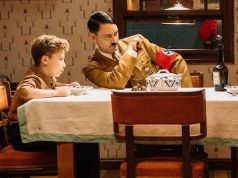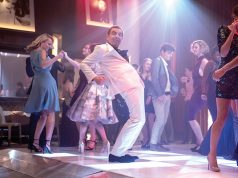What if Paul Verhoeven, director of tawdry fare such as “Basic Instinct” and “Showgirls,” had made “Schindler’s List”? It sounds like the premise of a “Saturday Night Live” sketch, but Verhoeven has beaten them to it. He has made a film called “Black Book,” which has the social significance of a Holocaust film while also featuring a Jewish woman revealing her breasts to a Nazi officer and saying, tauntingly, “Are THESE Jewish?”
This is a film that wants to be cheap and tawdry, but in a thoughtful, solemn way. It wants you to be moved and inspired, but it wants you to smack its butt and call it Susan, too. Paul Verhoeven wants us to treat his movie like a dirty whore all night, but respect it in the morning.
I’m afraid I’m not up to the challenge. There are many things I like about the film — it’s certainly the most accomplished and mature work that Verhoeven (who also made “Starship Troopers” and “Total Recall”) has done, and the lead performance is remarkably brave — but when all is said and done, it’s a cheap, gratuitous film about sex and the Holocaust. I found myself shaking my head and chuckling a lot. “Oh, Verhoeven!” I’d think. “You scamp, you!” And I don’t think that’s the reaction one should be having to a Holocaust movie.
It’s the rather epic story of Rachel Stein (Carice van Houten), a Dutch woman whom we first meet in September 1944, when she’s hiding Anne Frank-style in a house owned by a Christian family. To earn her breakfast every morning, she has to memorize a New Testament verse. I guess the Christians figure if they can convert her away from Judaism, she won’t have to hide in their back room anymore.
Her hiding place is soon taken out of commission, though, and Rachel’s on the run. Like a character in a Dickens novel, she bounces from one colorful situation to another, and every time we think we’ve reached the main thread of the story, there’s an unexpected death and a new scenario for Rachel to adjust to.
That’s when the film is good. It’s harsh and uncompromising, just like the war, and Verhoeven (who co-wrote the script with Gerard Soeteman) hints at the possibility of making a grand, serious World War II film, something utterly unlike anything he’s ever done.
But Verhoeven fights those urges and gives in to his shallow, voyeuristic tendencies instead. He has Rachel use her feminine wiles to cozy up to a German officer named Muntze (Sebastian Koch), hoping to get him to release some Resistance members currently being imprisoned. Rachel is working with the Resistance forces, of course, and they’ve sent her undercover as a non-Jewish typist named Ellis to infiltrate the Nazis’ offices in occupied The Hague. Her fellow freedom fighters await her reports back at their secret headquarters, and the ultimate goal is for her to plant a bug in Muntze’s office.
“Ellis” befriends Ronnie (Halina Reijn), a fellow secretary who has already learned how to use her mammary assets to her advantage: She’s sleeping with Franken (Waldemar Kobus), the evil, sniveling German officer who killed someone close to Rachel earlier in the film. It kills Rachel to work in the same offices as this villain, but she mustn’t blow her cover.
It isn’t long before Ellis’ true heritage is discovered — if there’s one thing the Nazis were good at, it was spotting a Jew — and so the question is what Muntze will do with the information. He’s painted as a decent man, basically, albeit one who’s on the wrong side of the war. Furthermore, he’s fallen in love with Rachel/Ellis, so there’s THAT to be dealt with.
This is not a romance film, however; it is war, and war is hell, and there is ample blood and mayhem as the Resistance efforts become more desperate and Rachel’s situation becomes more precarious. I can’t quite keep track of all the alliances and double-crosses in the end, but the general sense of it is visceral and thrilling.
Yet every time I start to respect the film’s tactics, Verhoeven does something exploitative like stripping his leading lady of all her clothes and dumping a bucket of human waste on her. Moments like that make me marvel at Carice van Houten’s steely, sexy performance while I simultaneously wonder what in the world Verhoeven was thinking. Rachel is a sexually liberated woman using her femininity as a weapon against the Nazis, flirting and steaming up the place like Lolita (or, if you prefer, like Sharon Stone in Verhoeven’s most famous film). It’s an intriguing concept, this idea of using whatever means you have available to survive the war, and it could be handled tastefully rather than crassly and bawdily. Verhoeven, obviously, did not go that route.
The director was born in Amsterdam in 1938 and lived through the occupation of his country as a young child. Obviously the war means something to him on a personal level. I suspect that “Black Book” — with all its gratuitous sex and nudity and its barrage of carnage and its naked women covered in poop — is as honestly respectful and meaningful a film as he, Paul Verhoeven, could make on the subject. In other words, I don’t think he’s being so Verhoeven-y on purpose; I think it’s just who he is. The director of “Hollow Man” and “Showgirls” made a movie about the Holocaust. You were expecting something classy?
C (2 hrs., 25 min.; in Dutch and German with subtitles; )





